Healthcare Review: Mental Health, HIV in Tanzania, and Immunotherapy
VerifiedAdded on 2023/06/13
|5
|1252
|331
Literature Review
AI Summary
This literature review analyzes several pressing healthcare challenges. It begins with an examination of the connection between substance use, mental health, and sexual minority status among college athletes, highlighting disparities and coping mechanisms. The review then considers the rising AIDS-related deaths among HIV-positive adolescents in Tanzania, emphasizing the role of mental health difficulties and stigma in ART adherence. Finally, it explores the effectiveness of immunotherapies for cancer treatment, focusing on T cell transfer immunotherapy, checkpoint inhibitors, and bivalent antibodies, while acknowledging both the prospects and challenges of these treatments. The articles reviewed contribute to the broader understanding of these health issues and suggest potential intervention strategies. Desklib provides access to this document and many other study resources for students.
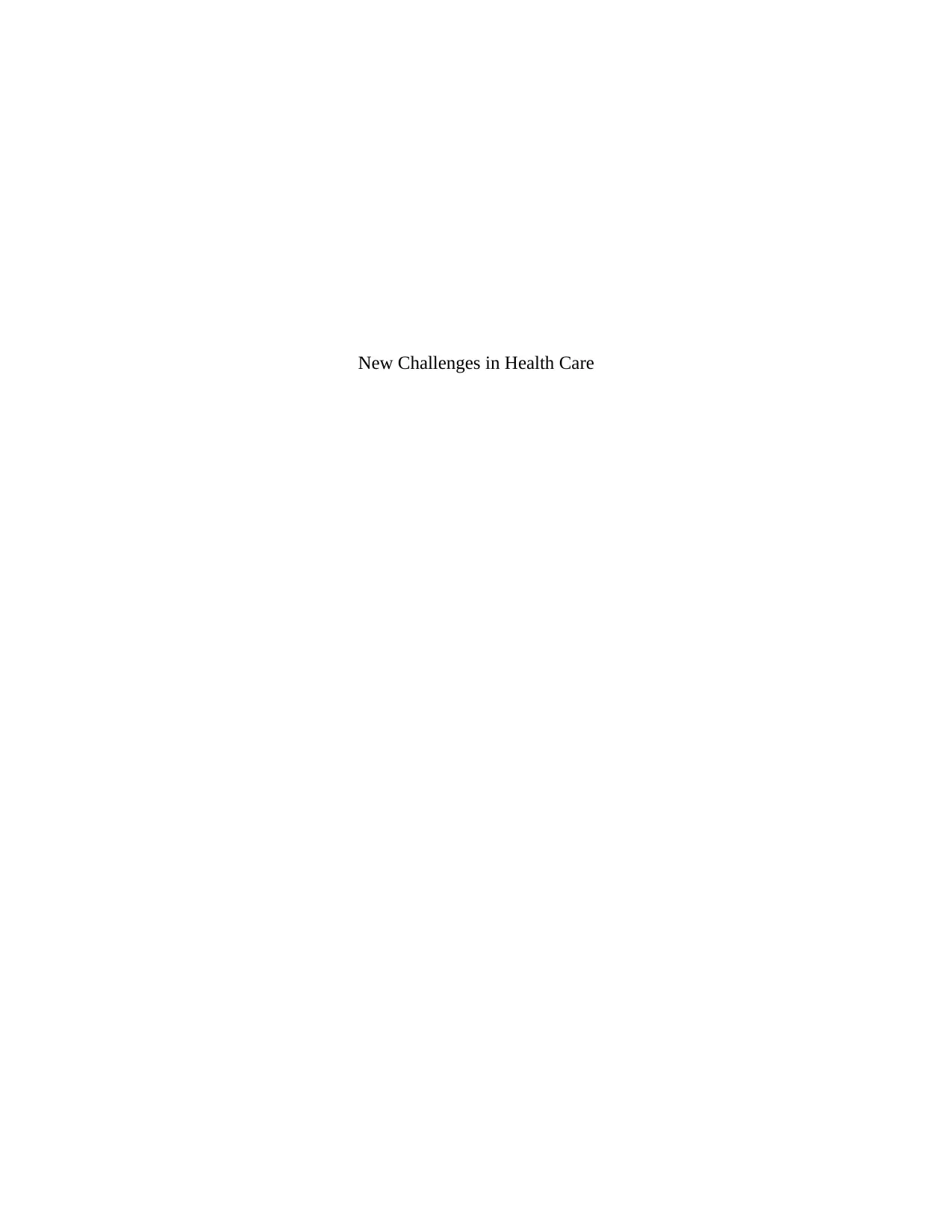
New Challenges in Health Care
Paraphrase This Document
Need a fresh take? Get an instant paraphrase of this document with our AI Paraphraser
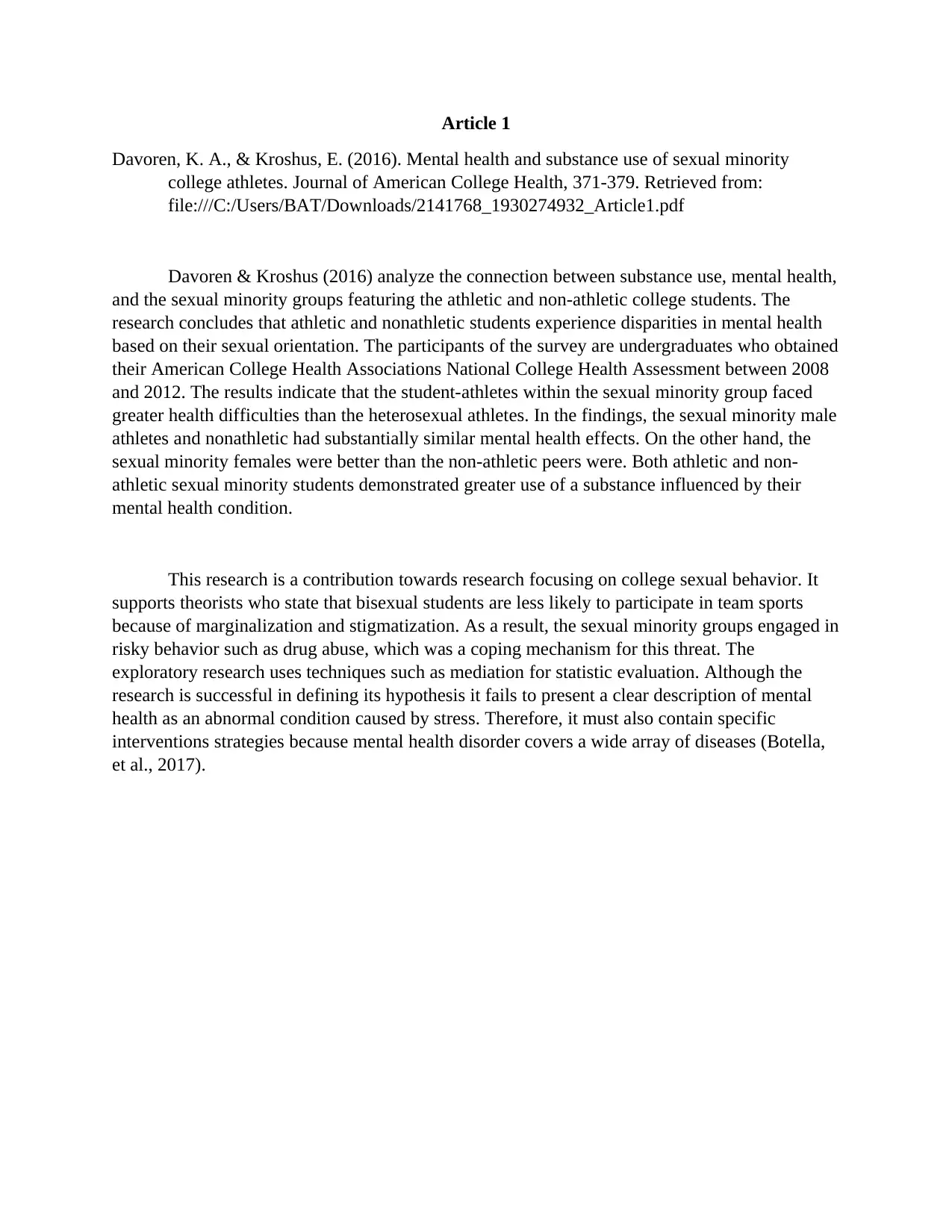
Article 1
Davoren, K. A., & Kroshus, E. (2016). Mental health and substance use of sexual minority
college athletes. Journal of American College Health, 371-379. Retrieved from:
file:///C:/Users/BAT/Downloads/2141768_1930274932_Article1.pdf
Davoren & Kroshus (2016) analyze the connection between substance use, mental health,
and the sexual minority groups featuring the athletic and non-athletic college students. The
research concludes that athletic and nonathletic students experience disparities in mental health
based on their sexual orientation. The participants of the survey are undergraduates who obtained
their American College Health Associations National College Health Assessment between 2008
and 2012. The results indicate that the student-athletes within the sexual minority group faced
greater health difficulties than the heterosexual athletes. In the findings, the sexual minority male
athletes and nonathletic had substantially similar mental health effects. On the other hand, the
sexual minority females were better than the non-athletic peers were. Both athletic and non-
athletic sexual minority students demonstrated greater use of a substance influenced by their
mental health condition.
This research is a contribution towards research focusing on college sexual behavior. It
supports theorists who state that bisexual students are less likely to participate in team sports
because of marginalization and stigmatization. As a result, the sexual minority groups engaged in
risky behavior such as drug abuse, which was a coping mechanism for this threat. The
exploratory research uses techniques such as mediation for statistic evaluation. Although the
research is successful in defining its hypothesis it fails to present a clear description of mental
health as an abnormal condition caused by stress. Therefore, it must also contain specific
interventions strategies because mental health disorder covers a wide array of diseases (Botella,
et al., 2017).
Davoren, K. A., & Kroshus, E. (2016). Mental health and substance use of sexual minority
college athletes. Journal of American College Health, 371-379. Retrieved from:
file:///C:/Users/BAT/Downloads/2141768_1930274932_Article1.pdf
Davoren & Kroshus (2016) analyze the connection between substance use, mental health,
and the sexual minority groups featuring the athletic and non-athletic college students. The
research concludes that athletic and nonathletic students experience disparities in mental health
based on their sexual orientation. The participants of the survey are undergraduates who obtained
their American College Health Associations National College Health Assessment between 2008
and 2012. The results indicate that the student-athletes within the sexual minority group faced
greater health difficulties than the heterosexual athletes. In the findings, the sexual minority male
athletes and nonathletic had substantially similar mental health effects. On the other hand, the
sexual minority females were better than the non-athletic peers were. Both athletic and non-
athletic sexual minority students demonstrated greater use of a substance influenced by their
mental health condition.
This research is a contribution towards research focusing on college sexual behavior. It
supports theorists who state that bisexual students are less likely to participate in team sports
because of marginalization and stigmatization. As a result, the sexual minority groups engaged in
risky behavior such as drug abuse, which was a coping mechanism for this threat. The
exploratory research uses techniques such as mediation for statistic evaluation. Although the
research is successful in defining its hypothesis it fails to present a clear description of mental
health as an abnormal condition caused by stress. Therefore, it must also contain specific
interventions strategies because mental health disorder covers a wide array of diseases (Botella,
et al., 2017).
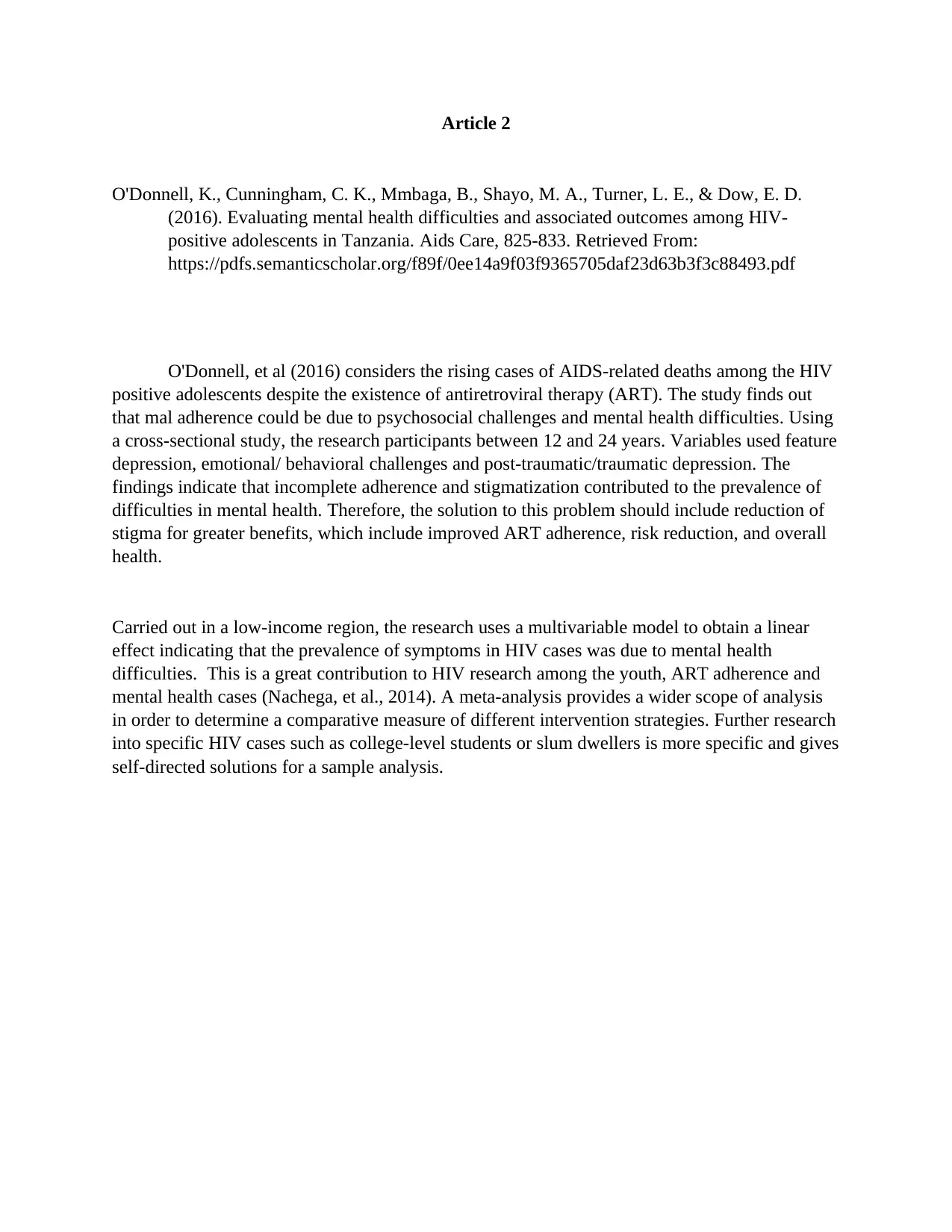
Article 2
O'Donnell, K., Cunningham, C. K., Mmbaga, B., Shayo, M. A., Turner, L. E., & Dow, E. D.
(2016). Evaluating mental health difficulties and associated outcomes among HIV-
positive adolescents in Tanzania. Aids Care, 825-833. Retrieved From:
https://pdfs.semanticscholar.org/f89f/0ee14a9f03f9365705daf23d63b3f3c88493.pdf
O'Donnell, et al (2016) considers the rising cases of AIDS-related deaths among the HIV
positive adolescents despite the existence of antiretroviral therapy (ART). The study finds out
that mal adherence could be due to psychosocial challenges and mental health difficulties. Using
a cross-sectional study, the research participants between 12 and 24 years. Variables used feature
depression, emotional/ behavioral challenges and post-traumatic/traumatic depression. The
findings indicate that incomplete adherence and stigmatization contributed to the prevalence of
difficulties in mental health. Therefore, the solution to this problem should include reduction of
stigma for greater benefits, which include improved ART adherence, risk reduction, and overall
health.
Carried out in a low-income region, the research uses a multivariable model to obtain a linear
effect indicating that the prevalence of symptoms in HIV cases was due to mental health
difficulties. This is a great contribution to HIV research among the youth, ART adherence and
mental health cases (Nachega, et al., 2014). A meta-analysis provides a wider scope of analysis
in order to determine a comparative measure of different intervention strategies. Further research
into specific HIV cases such as college-level students or slum dwellers is more specific and gives
self-directed solutions for a sample analysis.
O'Donnell, K., Cunningham, C. K., Mmbaga, B., Shayo, M. A., Turner, L. E., & Dow, E. D.
(2016). Evaluating mental health difficulties and associated outcomes among HIV-
positive adolescents in Tanzania. Aids Care, 825-833. Retrieved From:
https://pdfs.semanticscholar.org/f89f/0ee14a9f03f9365705daf23d63b3f3c88493.pdf
O'Donnell, et al (2016) considers the rising cases of AIDS-related deaths among the HIV
positive adolescents despite the existence of antiretroviral therapy (ART). The study finds out
that mal adherence could be due to psychosocial challenges and mental health difficulties. Using
a cross-sectional study, the research participants between 12 and 24 years. Variables used feature
depression, emotional/ behavioral challenges and post-traumatic/traumatic depression. The
findings indicate that incomplete adherence and stigmatization contributed to the prevalence of
difficulties in mental health. Therefore, the solution to this problem should include reduction of
stigma for greater benefits, which include improved ART adherence, risk reduction, and overall
health.
Carried out in a low-income region, the research uses a multivariable model to obtain a linear
effect indicating that the prevalence of symptoms in HIV cases was due to mental health
difficulties. This is a great contribution to HIV research among the youth, ART adherence and
mental health cases (Nachega, et al., 2014). A meta-analysis provides a wider scope of analysis
in order to determine a comparative measure of different intervention strategies. Further research
into specific HIV cases such as college-level students or slum dwellers is more specific and gives
self-directed solutions for a sample analysis.
⊘ This is a preview!⊘
Do you want full access?
Subscribe today to unlock all pages.

Trusted by 1+ million students worldwide
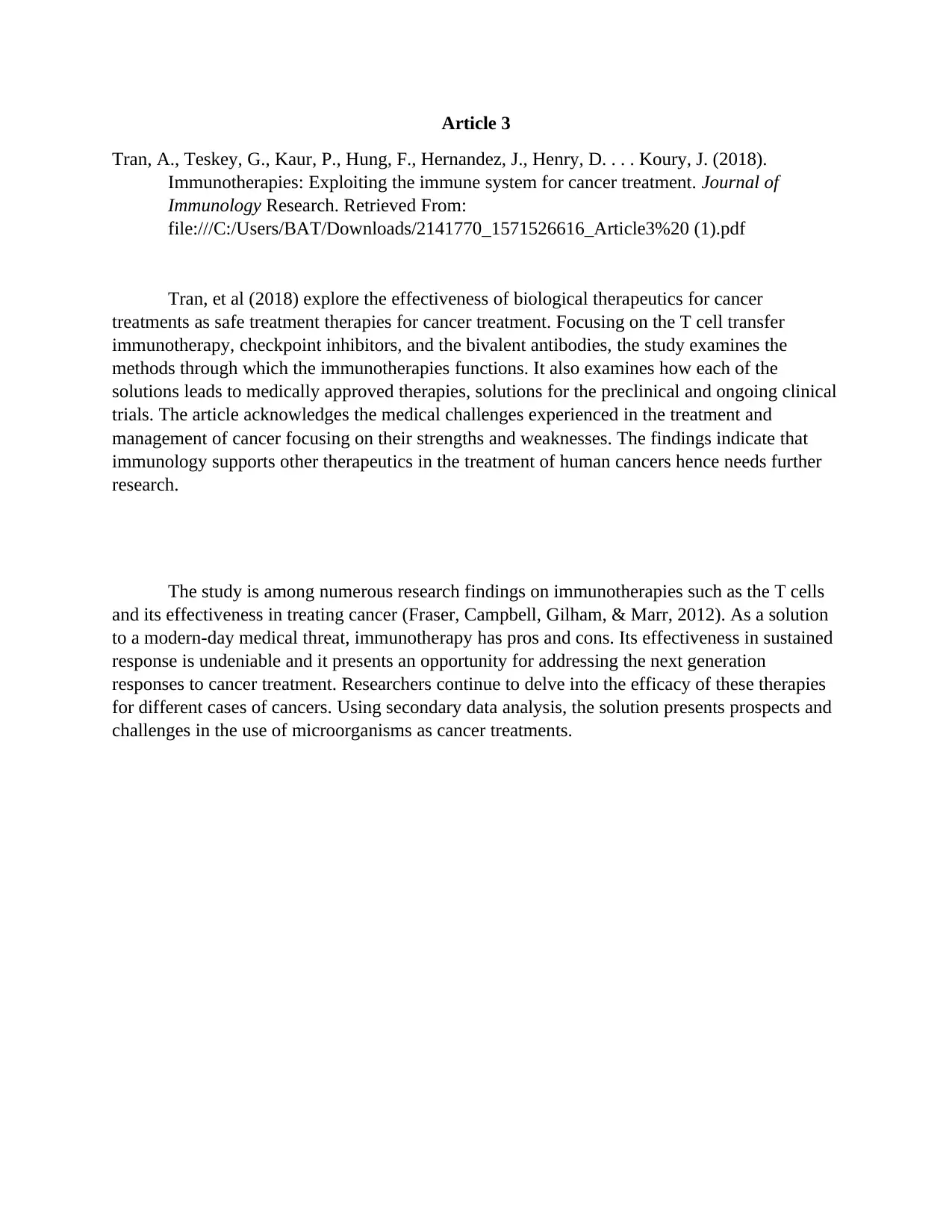
Article 3
Tran, A., Teskey, G., Kaur, P., Hung, F., Hernandez, J., Henry, D. . . . Koury, J. (2018).
Immunotherapies: Exploiting the immune system for cancer treatment. Journal of
Immunology Research. Retrieved From:
file:///C:/Users/BAT/Downloads/2141770_1571526616_Article3%20 (1).pdf
Tran, et al (2018) explore the effectiveness of biological therapeutics for cancer
treatments as safe treatment therapies for cancer treatment. Focusing on the T cell transfer
immunotherapy, checkpoint inhibitors, and the bivalent antibodies, the study examines the
methods through which the immunotherapies functions. It also examines how each of the
solutions leads to medically approved therapies, solutions for the preclinical and ongoing clinical
trials. The article acknowledges the medical challenges experienced in the treatment and
management of cancer focusing on their strengths and weaknesses. The findings indicate that
immunology supports other therapeutics in the treatment of human cancers hence needs further
research.
The study is among numerous research findings on immunotherapies such as the T cells
and its effectiveness in treating cancer (Fraser, Campbell, Gilham, & Marr, 2012). As a solution
to a modern-day medical threat, immunotherapy has pros and cons. Its effectiveness in sustained
response is undeniable and it presents an opportunity for addressing the next generation
responses to cancer treatment. Researchers continue to delve into the efficacy of these therapies
for different cases of cancers. Using secondary data analysis, the solution presents prospects and
challenges in the use of microorganisms as cancer treatments.
Tran, A., Teskey, G., Kaur, P., Hung, F., Hernandez, J., Henry, D. . . . Koury, J. (2018).
Immunotherapies: Exploiting the immune system for cancer treatment. Journal of
Immunology Research. Retrieved From:
file:///C:/Users/BAT/Downloads/2141770_1571526616_Article3%20 (1).pdf
Tran, et al (2018) explore the effectiveness of biological therapeutics for cancer
treatments as safe treatment therapies for cancer treatment. Focusing on the T cell transfer
immunotherapy, checkpoint inhibitors, and the bivalent antibodies, the study examines the
methods through which the immunotherapies functions. It also examines how each of the
solutions leads to medically approved therapies, solutions for the preclinical and ongoing clinical
trials. The article acknowledges the medical challenges experienced in the treatment and
management of cancer focusing on their strengths and weaknesses. The findings indicate that
immunology supports other therapeutics in the treatment of human cancers hence needs further
research.
The study is among numerous research findings on immunotherapies such as the T cells
and its effectiveness in treating cancer (Fraser, Campbell, Gilham, & Marr, 2012). As a solution
to a modern-day medical threat, immunotherapy has pros and cons. Its effectiveness in sustained
response is undeniable and it presents an opportunity for addressing the next generation
responses to cancer treatment. Researchers continue to delve into the efficacy of these therapies
for different cases of cancers. Using secondary data analysis, the solution presents prospects and
challenges in the use of microorganisms as cancer treatments.
Paraphrase This Document
Need a fresh take? Get an instant paraphrase of this document with our AI Paraphraser
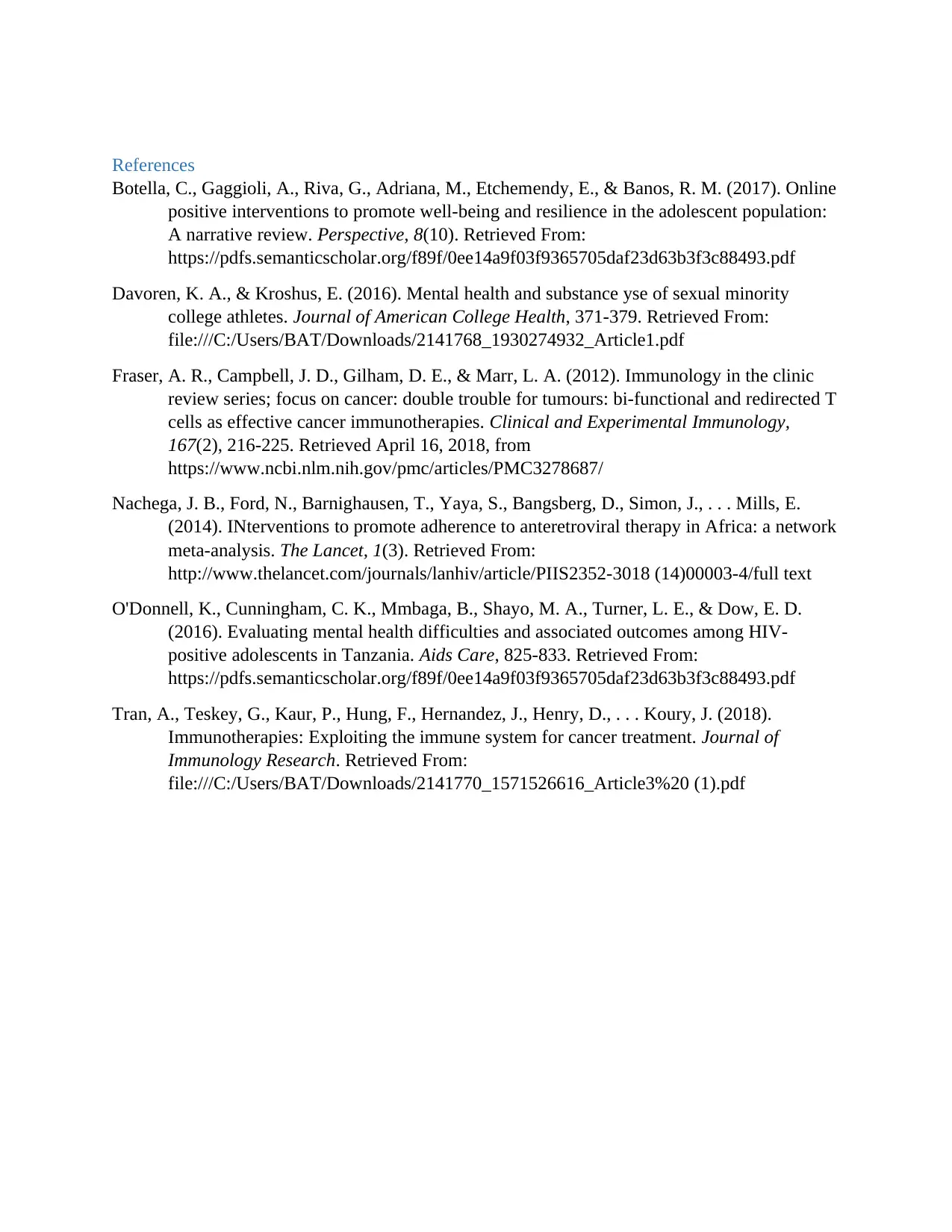
References
Botella, C., Gaggioli, A., Riva, G., Adriana, M., Etchemendy, E., & Banos, R. M. (2017). Online
positive interventions to promote well-being and resilience in the adolescent population:
A narrative review. Perspective, 8(10). Retrieved From:
https://pdfs.semanticscholar.org/f89f/0ee14a9f03f9365705daf23d63b3f3c88493.pdf
Davoren, K. A., & Kroshus, E. (2016). Mental health and substance yse of sexual minority
college athletes. Journal of American College Health, 371-379. Retrieved From:
file:///C:/Users/BAT/Downloads/2141768_1930274932_Article1.pdf
Fraser, A. R., Campbell, J. D., Gilham, D. E., & Marr, L. A. (2012). Immunology in the clinic
review series; focus on cancer: double trouble for tumours: bi-functional and redirected T
cells as effective cancer immunotherapies. Clinical and Experimental Immunology,
167(2), 216-225. Retrieved April 16, 2018, from
https://www.ncbi.nlm.nih.gov/pmc/articles/PMC3278687/
Nachega, J. B., Ford, N., Barnighausen, T., Yaya, S., Bangsberg, D., Simon, J., . . . Mills, E.
(2014). INterventions to promote adherence to anteretroviral therapy in Africa: a network
meta-analysis. The Lancet, 1(3). Retrieved From:
http://www.thelancet.com/journals/lanhiv/article/PIIS2352-3018 (14)00003-4/full text
O'Donnell, K., Cunningham, C. K., Mmbaga, B., Shayo, M. A., Turner, L. E., & Dow, E. D.
(2016). Evaluating mental health difficulties and associated outcomes among HIV-
positive adolescents in Tanzania. Aids Care, 825-833. Retrieved From:
https://pdfs.semanticscholar.org/f89f/0ee14a9f03f9365705daf23d63b3f3c88493.pdf
Tran, A., Teskey, G., Kaur, P., Hung, F., Hernandez, J., Henry, D., . . . Koury, J. (2018).
Immunotherapies: Exploiting the immune system for cancer treatment. Journal of
Immunology Research. Retrieved From:
file:///C:/Users/BAT/Downloads/2141770_1571526616_Article3%20 (1).pdf
Botella, C., Gaggioli, A., Riva, G., Adriana, M., Etchemendy, E., & Banos, R. M. (2017). Online
positive interventions to promote well-being and resilience in the adolescent population:
A narrative review. Perspective, 8(10). Retrieved From:
https://pdfs.semanticscholar.org/f89f/0ee14a9f03f9365705daf23d63b3f3c88493.pdf
Davoren, K. A., & Kroshus, E. (2016). Mental health and substance yse of sexual minority
college athletes. Journal of American College Health, 371-379. Retrieved From:
file:///C:/Users/BAT/Downloads/2141768_1930274932_Article1.pdf
Fraser, A. R., Campbell, J. D., Gilham, D. E., & Marr, L. A. (2012). Immunology in the clinic
review series; focus on cancer: double trouble for tumours: bi-functional and redirected T
cells as effective cancer immunotherapies. Clinical and Experimental Immunology,
167(2), 216-225. Retrieved April 16, 2018, from
https://www.ncbi.nlm.nih.gov/pmc/articles/PMC3278687/
Nachega, J. B., Ford, N., Barnighausen, T., Yaya, S., Bangsberg, D., Simon, J., . . . Mills, E.
(2014). INterventions to promote adherence to anteretroviral therapy in Africa: a network
meta-analysis. The Lancet, 1(3). Retrieved From:
http://www.thelancet.com/journals/lanhiv/article/PIIS2352-3018 (14)00003-4/full text
O'Donnell, K., Cunningham, C. K., Mmbaga, B., Shayo, M. A., Turner, L. E., & Dow, E. D.
(2016). Evaluating mental health difficulties and associated outcomes among HIV-
positive adolescents in Tanzania. Aids Care, 825-833. Retrieved From:
https://pdfs.semanticscholar.org/f89f/0ee14a9f03f9365705daf23d63b3f3c88493.pdf
Tran, A., Teskey, G., Kaur, P., Hung, F., Hernandez, J., Henry, D., . . . Koury, J. (2018).
Immunotherapies: Exploiting the immune system for cancer treatment. Journal of
Immunology Research. Retrieved From:
file:///C:/Users/BAT/Downloads/2141770_1571526616_Article3%20 (1).pdf
1 out of 5
Your All-in-One AI-Powered Toolkit for Academic Success.
+13062052269
info@desklib.com
Available 24*7 on WhatsApp / Email
![[object Object]](/_next/static/media/star-bottom.7253800d.svg)
Unlock your academic potential
Copyright © 2020–2026 A2Z Services. All Rights Reserved. Developed and managed by ZUCOL.